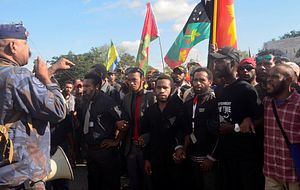Later this month, Papua New Guinea will go to the polls to elect a new government. The country’s seven million people, who are spread across several islands and speak more than 800 languages, form one of the most diverse electorates. Once famed for its natural resources, Papua New Guinea is among the world’s poorest countries, a fact that is keenly felt today as the economic boom of a few years ago has yielded to a mere 2 percent annual growth.
In recent years, the country has witnessed a catalogue of human rights violations involving the police and other security forces. As the government failed to put the protection of its people at the heart of its policies, the most marginalized in society suffered horrific levels of violence: women, sex workers, LGBTI people, prisoners, students, and, of course, refugees.
Papua New Guinea is one of the world’s most dangerous places to be a woman, with the highest levels of family and sexual violence anywhere outside a conflict zone. According to the United Nations Development Fund for Women, more than two-thirds of women in Papua New Guinea have suffered domestic violence. There are estimates that as many as half of all women have been victims of sexual violence.
For sex workers, the ordeals are no less harrowing. Last year, Amnesty International published a report detailing the extreme levels of violence and abuse that sex workers – who can be women, men, and transgender people – are likely to face in police custody. I interviewed people who told me of being subject to rape or violence from the police. When crimes are committed against them, they said, the police do not take their complaints seriously.
Substantive inequality, on the basis of social status, poverty, gender identity or sexual orientation, reinforces the marginalization of sex workers. Criminal laws prohibiting the sale of sex give the police the opportunity to abuse or extort them. Already victims of the social stigma attached to them, they become trapped in a cycle of poverty, making it harder for them to seek other forms of employment.
Under the government of Peter O’Neill, the police have been responsible for other acts of violence. Last June, they fired upon a group of unarmed students, leaving 38 injured, as they tried to march from their university to parliament. The students had gathered to protest against O’Neill amid allegations of corruption. The brazen shooting was a clear sign that the government will not tolerate dissent, let alone people’s rights to freedom of expression and peaceful assembly. No one has been held accountable, despite the promise of three inquiries.
Last month, the authorities shot and killed 17 prisoners who broke out of the notorious Buimo Prison in Lae. The prison break was not the first of its kind. Overcrowding, poor sanitation and hygiene conditions, and excessive periods of remand have made them all but inevitable. The authorities are well aware of the cause of the problem, yet they persist with their same abusive and even lethal practices. In February 2016, 12 prisoners were also shot and killed trying to flee the same prison.
The conditions of detention are scarcely better at the refugee center on Manus Island, where the Australian government keeps more than 800 refugees and asylum seekers confined in cruel, inhuman and degrading conditions, despite the Papua New Guinea Supreme Court ruling that its operations are illegal.
The dangers faced by refugees in this inherently abusive offshore detention policy were underscored on April 14, when a group of drunken Papua New Guinea soldiers fired at the refugee center. At first, Australia’s Immigration Department claimed that shots had only been fired in the air. Digital verification by Amnesty International established that multiple shots had been fired directly at the center, findings that were subsequently confirmed by the Papua New Guinea police and the Australian government itself.
There has still been no outcome to the formal investigations. The Papua New Guinea and Australian governments are complicit in their refusal to take responsibility for the welfare of the people immured on Manus Island. Even as Australia claims that it will shut down the center later this year, there are no clear plans to resettle the refugees. There has been no consultation with the local community, as promised, either.
The Australian government was supposed to be helping Papua New Guinea pull away from its cycles of violence, providing more than half a billion Australian dollars in aid per year for better governance, economic growth and “enhanced human development.” But under the outgoing government, those funds have not seen the emergence of accountability for the police and other security forces. Instead, the two countries have collaborated in ways that make people on Papua New Guinea even more vulnerable to human rights abuses.
The parties campaigning to form the next Papua New Guinea government must break with this ugly past by putting the protection of people’s rights at the very heart of its policies. As they court people’s votes, they must pledge to honor their dignity as well, making an overriding commitment to hold the police and others responsible for violence to account, while also addressing substantive inequality for the most marginalized people of the islands.
Kate Schuetze is Amnesty International’s Pacific Researcher

































